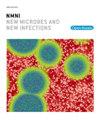具有流行潜力的虫媒病毒感染的新型和重新用途的抗病毒分子:系统综述
IF 5.4
Q2 INFECTIOUS DISEASES
引用次数: 0
摘要
本系统综述研究了登革热病毒(DENV)、寨卡病毒(ZIKV)、基孔肯雅病毒(CHIKV)、西尼罗河病毒(WNV)和乌苏图病毒(USUV)等具有流行潜力的虫媒病毒的实验性抗病毒分子。虫媒病毒性疾病日益引起公共卫生关注,气候变化和全球旅行增加加剧了这一问题。尽管没有针对大多数虫媒病毒的批准抗病毒疗法,但许多体外、体内和人体研究已经评估了针对病毒复制不同阶段的候选分子。方法:我们的方法遵循系统评价和荟萃分析(PRISMA) 2020指南的首选报告项目。检索Pubmed、Embase和Cochrane图书馆的试验。纳入了2024年3月之前发表的研究。摘要审查和删除重复后,获得全文文章进行进一步审查,由两名独立审稿人审查,分歧由第三名审稿人解决。结果:我们的分析基于185项研究,强调了核苷类似物、蛋白酶抑制剂和免疫调节剂等分子的抗病毒作用。没有在人体中进行的研究报告显示任何分子的抗病毒功效。在体外和体内实验中,法匹拉韦、利巴韦林和索非布韦显示出病毒血症减少和症状改善。降胆固醇药物,如阿托伐他汀和依折麦比,显示出破坏病毒组装的希望。孟鲁司特和强力霉素表现出抗炎作用,有助于改善临床结果。细胞因子调节谱各不相同,在某些研究中,促炎标志物显著减少。结论:目前,还没有人类研究证明有效治疗虫媒病毒感染。尽管一些分子已经显示出降低病毒滴度的功效,但需要进一步的临床评估有希望的候选药物,并探索针对病毒复制和宿主免疫反应的联合疗法。本文章由计算机程序翻译,如有差异,请以英文原文为准。
Novel and repurposed antiviral molecules for arbovirus infections with epidemic Potential: A systematic review
Background
This systematic review investigates experimental and repurposed antiviral molecules for epidemic-potential arboviruses, including dengue (DENV), Zika (ZIKV), chikungunya (CHIKV), West Nile (WNV), and Usutu (USUV) viruses. Arboviral diseases pose a growing public health concern, exacerbated by climate change and increased global travel. Despite the absence of approved antiviral therapies for most arboviruses, numerous in vitro, in vivo and in human studies have evaluated candidate molecules targeting the different stages of viral replication. Methods: Our methods adhere to the Preferred Reporting Items for Systematic Reviews and Meta-Analyses (PRISMA) 2020 guidelines. Pubmed, Embase, and Cochrane Library trials were searched. Studies published until March 2024 were included. After abstract review and duplication removal, full-text articles were obtained for further review, reviewed by two independent reviewers, and disagreements were resolved by a third reviewer. Results: Our analysis, based on 185 studies, highlights the antiviral role of molecules such as nucleoside analogs, protease inhibitors, and immune-modulators. No studies conducted in humans have been reported to demonstrate the antiviral efficacy of any molecule. Favipiravir, ribavirin, and sofosbuvir demonstrated viremia reduction and symptoms improvement in vitro and in vivo experiments. Cholesterol-lowering agents, such as atorvastatin and ezetimibe, showed promise in disrupting viral assembly. Montelukast and doxycycline exhibited anti-inflammatory effects, contributing to improved clinical outcomes. The cytokine modulation profiles varied, with notable reductions in pro-inflammatory markers in certain studies. Conclusions: Currently, there are no studies in humans demonstrating effective treatments against arboviral infections. Although some molecules have shown efficacy in reducing viral titters, further clinical evaluation of promising candidates and the exploration of combination therapies targeting viral replication and host immune-response are needed.
求助全文
通过发布文献求助,成功后即可免费获取论文全文。
去求助
来源期刊

New Microbes and New Infections
Medicine-Infectious Diseases
CiteScore
10.00
自引率
2.50%
发文量
91
审稿时长
114 days
 求助内容:
求助内容: 应助结果提醒方式:
应助结果提醒方式:


